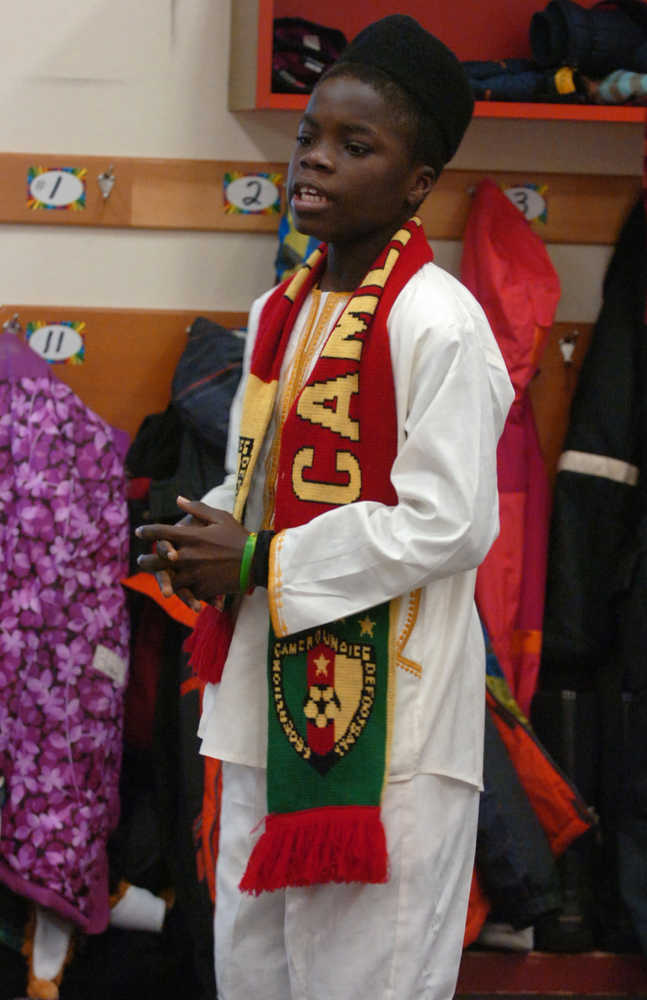Cameroon exchange student Nouredine Mama was given two days’ notice before he was flown to Alaska this fall.
The 16-year-old was already settled in Washington, D.C., and had started school when the exchange program he was with found him a host family. Two days later, he moved across the country and started school at Homer High School.
Mama fielded questions like, “Is it difficult to make money?” and “Don’t they have hippopotamuses?” from curious Nikolaevsk School students in the Russian Old Believer community Wednesday morning. The young man is attending the eleventh grade in Homer, thousands of miles from his home on Africa’s west coast, through the Kennedy-Lugar Youth Exchange and Study program.
More commonly referred to as the YES program, it was established by Congress in 2002 as a response to the events of 9/11 and brings teenage students from countries with large Muslim populations to the U.S. to promote American learning of those countries and cultures, according to the program’s website.
Throughout his stay in the Last Frontier for the academic year, Mama will be required to make the rounds in the Homer area to give presentations. On Wednesday, he regaled fourth, fifth and sixth graders, middle school and high school students at Nikolaevsk with the Republic of Cameroon’s history, diverse wildlife and landscape and unique cultural tidbits.
“I like to call my experience in America the start of something new, because it’s really the start of something new,” Mama said. “I am here because, yes I can, I can teach you about my country. That’s why I’m in the YES program, and I always say, ‘Yes, I can.’”
Most students are placed with host families prior to the first day of school, explained Mama’s host father, Matthew Mitchell. However, Mama and some others began school in Washington D.C. while still waiting for a placement. After flying to Alaska on Sept. 27, he has been sharing his story and culture with school students and church congregations while adjusting to the Alaskan way of life.
While changing schools after arriving to the U.S. was challenging, Mama said that for him, this whole experience is about trying new things. He is especially interested in U.S. history and the American government.
“I first asked her if she was kidding, because it was like, today, and she told me that tomorrow I’m going to move,” he said. “It was like, ‘You kidding?’”
Sporting leather sandals and a thick scarf bearing the Cameroon coat of arms, Mama recounted a tale about one of his first experiences with Alaska weather before his first presentation Wednesday.
“There is one thing that made me smile,” he said. “I left my water bottle inside my host mom’s car and the next morning I saw that the water bottle has become ice. I said, ‘It changed!’… I realized that you have to wear the jacket, the coat, all those warm clothes.”
Mitchell, whose family has hosted students from the YES program three times in the past, said he wasn’t given more information than Mama’s name until his family was on the way to pick him up from the airport. Soon after, they arranged a trip to Soldotna to get Mama everything he would need for a winter on the Kenai Peninsula.
Much of Mama’s speech centered on breaking down common stereotypes or generalizations people in America tend to have about countries in Africa. He began his presentation by stating that Cameroon is a country without technology, schools, or a myriad of other things, and proceeded to prove those assumptions false for the next hour.
Mama used information about Cameroon’s reliance on its exports to point out that it is not really that different from Alaska. “This one is the only thing that makes me different between you and I, you and your friend. That is education,” he said. “Education is the key to succeeding in life.”
Nikolaevsk Principal Michael Sellers said he reached out to Mama to visit the school after one of his teachers heard him speak at her local church. He said getting involved with a program born of a wish to help people from countries with strong Muslim populations and Americans get to know more about each other made it an easy decision.
“I went and Googled it, and I was really intrigued by the program,” Sellers said. “I thought, what a great opportunity, with… especially all the negative talk, this was just a really good way to inject some positive.”
Justin Trail, a sixth grade student, said he was surprised to learn “that one dollar of our money was like 550 dollars of theirs.” His desk mate Isaak Fefelov said he enjoyed learning about the different wildlife and traditions the Republic of Cameroon has to offer.
Others said they were surprised that, because Mama’s community in Cameroon counts age differently than the U.S., he is 15 in his home country.
Lindsey Blaine, who teaches the fourth through sixth grade students, said the school’s cultural influences make its students predisposed to be accepting of other lifestyles. Her students often hear from diverse speakers, which she said can only benefit their education.
“Any introduction to culture is really important, and the students were excited to have a change in their schedule, meet somebody new, hear about different culture,” Blaine said. “Being a school that has… Russian and non-Russian, we’ve got a lot of different culture within our own school.”
Reach Megan Pacer at megan.pacer@peninsulaclarion .com.

